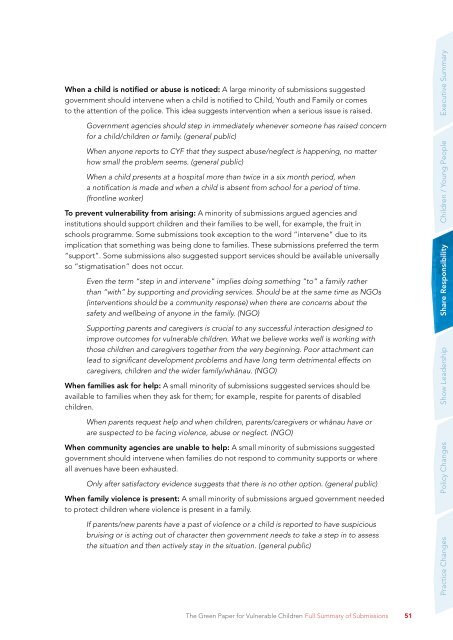The Green Paper for Vulnerable Children - Ministry of Social ...
The Green Paper for Vulnerable Children - Ministry of Social ...
The Green Paper for Vulnerable Children - Ministry of Social ...
Create successful ePaper yourself
Turn your PDF publications into a flip-book with our unique Google optimized e-Paper software.
When a child is notified or abuse is noticed: A large minority <strong>of</strong> submissions suggestedgovernment should intervene when a child is notified to Child, Youth and Family or comesto the attention <strong>of</strong> the police. This idea suggests intervention when a serious issue is raised.Government agencies should step in immediately whenever someone has raised concern<strong>for</strong> a child/children or family. (general public)When anyone reports to CYF that they suspect abuse/neglect is happening, no matterhow small the problem seems. (general public)When a child presents at a hospital more than twice in a six month period, whena notification is made and when a child is absent from school <strong>for</strong> a period <strong>of</strong> time.(frontline worker)To prevent vulnerability from arising: A minority <strong>of</strong> submissions argued agencies andinstitutions should support children and their families to be well, <strong>for</strong> example, the fruit inschools programme. Some submissions took exception to the word “intervene” due to itsimplication that something was being done to families. <strong>The</strong>se submissions preferred the term“support”. Some submissions also suggested support services should be available universallyso “stigmatisation” does not occur.Even the term “step in and intervene” implies doing something “to” a family ratherthan “with” by supporting and providing services. Should be at the same time as NGOs(interventions should be a community response) when there are concerns about thesafety and wellbeing <strong>of</strong> anyone in the family. (NGO)Supporting parents and caregivers is crucial to any successful interaction designed toimprove outcomes <strong>for</strong> vulnerable children. What we believe works well is working withthose children and caregivers together from the very beginning. Poor attachment canlead to significant development problems and have long term detrimental effects oncaregivers, children and the wider family/whānau. (NGO)When families ask <strong>for</strong> help: A small minority <strong>of</strong> submissions suggested services should beavailable to families when they ask <strong>for</strong> them; <strong>for</strong> example, respite <strong>for</strong> parents <strong>of</strong> disabledchildren.When parents request help and when children, parents/caregivers or whānau have orare suspected to be facing violence, abuse or neglect. (NGO)When community agencies are unable to help: A small minority <strong>of</strong> submissions suggestedgovernment should intervene when families do not respond to community supports or whereall avenues have been exhausted.Only after satisfactory evidence suggests that there is no other option. (general public)When family violence is present: A small minority <strong>of</strong> submissions argued government neededto protect children where violence is present in a family.If parents/new parents have a past <strong>of</strong> violence or a child is reported to have suspiciousbruising or is acting out <strong>of</strong> character then government needs to take a step in to assessthe situation and then actively stay in the situation. (general public)Practice Changes Policy Changes Show Leadership Share Responsibility <strong>Children</strong> / Young People Executive Summary<strong>The</strong> <strong>Green</strong> <strong>Paper</strong> <strong>for</strong> <strong>Vulnerable</strong> <strong>Children</strong> Full Summary <strong>of</strong> Submissions51
















